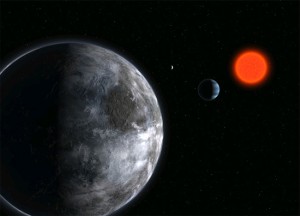Exoplanet search heats up

There has been a number of breakthroughs recently in both our search for habitable exoplanets and our understanding of how planets may populate the universe in general.
The nearby solar system Gliese which is only 20 or so light years away (in Galactic terms a next door neighbour) is again find itself under close scrutiny after a recent study by the Cornell University have confirmed that Gliese 581d is the first confirmed "terrestial-mass" exoplanet within a habitable zone.
It is suggested that the planet is in theory a very good candidate to support life and could in theory have liquid water and a stable atmosphere with temperatures above 0 degrees Celsius but is likely to be "tidally locked" (one side of the planet permanently facing the star while the other side is in perpetual darkness like our own moon).
At the same time while SETI is having to scale back it's own efforts to search for signs of extra-terresial life due to budget cuts they have decided to focus on looking for any signs of life on 86 planets that have been confirmed as being within the "goldilocks zone" (planets that are the right size and distance from their star to have likely surface temperatures of between 0 and 100 degrees Celsius).
Each of these planets will be scanned by the worlds largest steerable telescope, the Robert C. Byrd Green Bank Radio Telescope in West Virginia and then the subsequent data will be offered to the people signed up to the SETI@HOME project to crunch the information using their home computers.
As if that wasn't exciting enough an international team of astronomers also claim to have found 10 "free floating" planets that don't orbit any star and are not part of any solar system. Based upon their research and the number of rogue planets found in thier initial investigations they theorise that these type of planets could in fact be twice as popular as planets that form part of a solar system, throwing what we know about the volume of planets out there into serious disarray, you can read more about this at the BBC News website.
Exoplanet search heats upNews Archives
- August 2024
- July 2023
- April 2023
- February 2023
- September 2022
- March 2022
- February 2022
- July 2021
- June 2021
- April 2021
- March 2021
- January 2021
- October 2020
- September 2020
- June 2020
- March 2020
- May 2019
- January 2019
- November 2018
- January 2016
- September 2015
- August 2015
- July 2015
- June 2015
- May 2015
- April 2015
- March 2015
- January 2015
- October 2014
- June 2014
- April 2014
- March 2014
- February 2014
- January 2014
- December 2013
- November 2013
- October 2013
- September 2013
- June 2013
- May 2013
- April 2013
- March 2013
- January 2013
- December 2012
- November 2012
- August 2012
- July 2012
- June 2012
- May 2012
- April 2012
- March 2012
- February 2012
- January 2012
- December 2011
- November 2011
- October 2011
- September 2011
- August 2011
- July 2011
- June 2011
- May 2011
- April 2011
- March 2011
- February 2011
- January 2011
- December 2010
- November 2010
- October 2010
- September 2010
- August 2010
- July 2010
- June 2010
- May 2010
- April 2010
- March 2010
- February 2010
- January 2010
- December 2009
- November 2009
- October 2009
- September 2009
- August 2009
- July 2009
- June 2009
- May 2009
- April 2009
- March 2009
- February 2009
- January 2009
- December 2008
- November 2008
- October 2008
- September 2008
